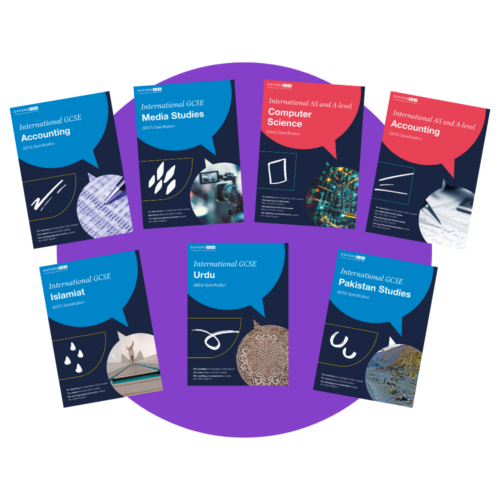
Fair Assessment is a unique, student-focused approach to assessment design, designed to remove common exam barriers for international students. This means that international students can really show what they can do, and get the grade they deserve.
In education, fair assessment can make the difference between students getting the grade they deserve and a grade that does not reflect their knowledge and skills. That difference can be life changing.
That’s why we at OxfordAQA put fairness first as an international exam board. We provide high quality, fair International GCSE, AS and A-level qualifications that let all students show what they can do.
Assessments exist because they allow students to demonstrate their abilities. Fair, accurate assessment mean that universities and employers can have confidence that students have the appropriate knowledge and skills to progress to further study and the workplace.
That is why we’ve developed a unique Fair Assessment approach, to ensure that our International GCSE, AS and A-level exams are fair. We draw on the knowledge and innovations of our partners AQA and Oxford University Press and we apply our specially-designed Fair Assessment methodology when we design our assessments. This is based around three core principles: our exams must be valid, reliable and comparable.
In order to have any value, assessments must only measure what they are supposed to measure. OxfordAQA’s Fair Assessment approach ensures that our assessments only assess what is important, in a way that ensures stronger candidates get higher marks. So our exams will never contain excessive or inaccessible language, irrelevant pictures or unfamiliar contexts.
So what is Fair Assessment?
For an assessment to be fair, it must:
- measure a student’s ability in the subject they have studied
- In order to have any value, assessments must only measure what they are supposed to measure.
- effectively differentiate student performance
- ensure no student is disadvantaged, including those who speak English as a second language
- give all students the same opportunity to achieve the right grade, irrespective of which exam series they take or which examiner marks their paper.
OxfordAQA exams were the first time our students could just answer the science rather than worrying about the language of the exams or the contexts they were being asked about.
How OxfordAQA International Qualifications achieve Fair Assessment
Our Fair Assessment approach underpins every aspect of our International GCSE, AS and A-level qualifications, from the design of our qualifications through the grading of exams. For example, we ensure Fair Assessment is integrated in each of these steps:
- Assessment design
- Examiner training
- Monitoring of marking
- Awarding meetings for setting grade boundaries
- Advice and support for schools and teachers
- Review of each exam series
- Improvement plans
Five pillars in particular define our unique Fair Assessment approach, which you can learn about in this video and in the boxes below:
Our Fair Assessment methodology is powered by a number of pillars
We draw on the assessment expertise and research that AQA has developed over more than 100 years. This is the same research that has enabled AQA to become the largest awarding body in the UK, marking over 7 million GCSEs and A-levels each year.
We also draw on the deep educational expertise of Oxford University Press, a department of the University of Oxford, to ensure students who speak English as a second language have the same opportunity to achieve a top grade as native English speakers.
This means that OxfordAQA’s team of exceptional assessment design experts are always developing, constantly ensuring that every single question in our exams is as clear, accurate and easy to understand as possible. They do this all while measuring student performance accurately, fairly and with rigorous comparability.
We use the Oxford 3000™ word list for all our exam papers to make sure all international students have the same chance to demonstrate their subject knowledge, whether English is their first language or not.
The Oxford 3000 is a list of the most important and useful words to learn in English, developed by dictionary and language learning experts within Oxford University Press. You can browse the Oxford 3000 list here.
When we develop our exam papers, we review all the questions using the Oxford 3000. If we identify any word that is not in the Oxford 3000 vocabulary list or subject vocabulary of the specification, we replace it or define it within the question. This means that every student can be confident they will not come across unfamiliar vocabulary in our exams.
The Oxford 3000 ensures that no international student is advantaged or disadvantaged when they answer an exam question, whether English is their first or an additional language.
The difficulty of questions in exams will only ever increase in terms of the subject matter, skills and assessment objectives – never through the language the question uses. This approach of ensuring fairness in education is unique to OxfordAQA among UK-curriculum international exam boards.
Learn more about the Oxford 3000™
A valid exam measures the specific areas of knowledge and ability that it wants to test – and nothing else.
For International GCSE, AS and A-level qualifications, this means that exams questions are invalid if they contain unnecessary complex language that is not part of the specification or examples and contexts that are not familiar to international students that have never been to the UK. Such questions can create an unfair barrier for international students that speak English as a Second Language.
OxfordAQA International Qualifications test students solely on their ability in the subject – not their language skills to comprehend the language of a question or cultural knowledge of the UK.
Apart from using the Oxford 3000™, we also choose contexts that are relevant to international students and use the latest research and assessment best practice to format clear exam questions, so that students know exactly what to do.
Learn more about how we achieve validity >
A reliable exam measures performance consistently so every student gets the right grade. Successfully delivering a reliable assessment requires high quality mark schemes and a sophisticated process of examiner training and support.
It’s a highly technical aspect of Fair Assessment and we have led the development of expertise and best practice through our research in this area.
Learn more about how we achieve reliability >
For a qualification to be comparable, the grade boundaries must reflect exactly the same standard of student performance from series to series.
It means that if the student were to take the exam in a different year, they would achieve the same result.
In the case of international British curriculum qualifications, the standard of performance at each grade should also be comparable to the GCSEs and A-levels currently taken in England. This ensures that international qualifications maintain their value and currency with universities and employers.
Learn more about how we achieve comparability >
Learn more about the science behind fair assessment in education
- Learn how we design international exams that are valid
- Learn how we ensure that our international exams are reliable
- Learn how we achieve international exams that are comparable
When students take an OxfordAQA exam, they are given the best possible opportunity to demonstrate what they know and can do.



